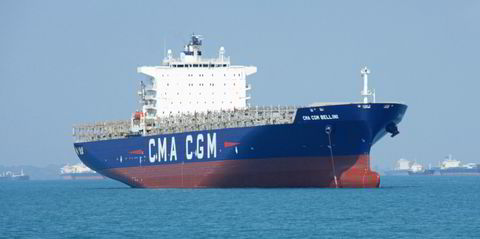Cypriot shipowners and ship managers joined the chorus of criticism against the way the European Commission plans to decarbonise their industry.
The “Fit for 55” measures — to cut emissions to 55% below 1990 levels by 2030 — proposed earlier this month by the European Union’s executive body “may prove ineffective and at the same time greatly impact European shipowners and undermine global efforts to meet the required environmental objectives,” the Cyprus Shipping Chamber (CSC) said.
The CSC represents about 200 shipping-related companies and associations in its home country, which is Europe’s biggest ship-management hub.
The CSC’s position is similar to the line taken last week by the Union of Greek Shipowners (UGS).
This means that the main maritime organisations of the EU’s biggest shipowning and biggest ship-management nations are vowing to lobby for significant changes to the EC plans before they become European law.
“Appreciating that the proposals will be considered further in the EU, the chamber looks forward to working with the Cyprus flag, the European Parliament, the European Commission and other stakeholders to achieve the adoption of a pragmatic and realistic approach through the proposals,” the CSC said.
“Our aim remains to develop rules that are not only environmentally ambitious in theory but also workable in practice and compatible with our industry’s international characteristics,” it added.
The governments of Greece and Cyprus, which are both EU members, are likely to fall in line with their shipping organisations. Shipping is a mainstay industry and a significant foreign currency earner in both countries.
Tall task
Forces sympathetic to shipping have already notched up a notable success, in swaying the EC to recognise the principle that charterers and commercial operators in general should carry part of ships’ carbon costs.
Wringing more concessions out of the EU, however, will be challenging.
The voting power of Greece and Cyprus in EU institutions is too small compared with that of countries such as Germany and France, which have a much bigger influence in shaping EU policy and are pushing the bloc to adopt a drastic environmental agenda.
German resolve may harden even more if the country's Green party leads a governing coalition there after elections in September.
Environmental organisations that would have liked the EU to turn the screws on shipping even tighter carry clout in the European Parliament — an institution which will play a key role in finalising the plans.
Undermining global efforts?
Including shipping in Europe’s Emissions Trading System (ETS) and forcing the industry to use greener fuels through the FuelEU Maritime regulation will backfire, according to the CSC.
“While intended to accelerate the sector’s energy transition to cleaner fuels, [they] do not ensure that absolute emissions reductions will be achieved,” the organisation said, while acknowledging “the need for immediate action to face the climate crisis”.
Fluctuating carbon prices in ETS do not suit small and medium enterprises, which constitute the vast majority of shipping companies, said the CSC — in line with arguments put forward by other shipping organisations.
Furthermore, FuelEU Maritime “unfairly” targets ship operators who cannot be held responsible for fuel quality or availability and imposes yet another administrative burden on them, the CSC argued.







